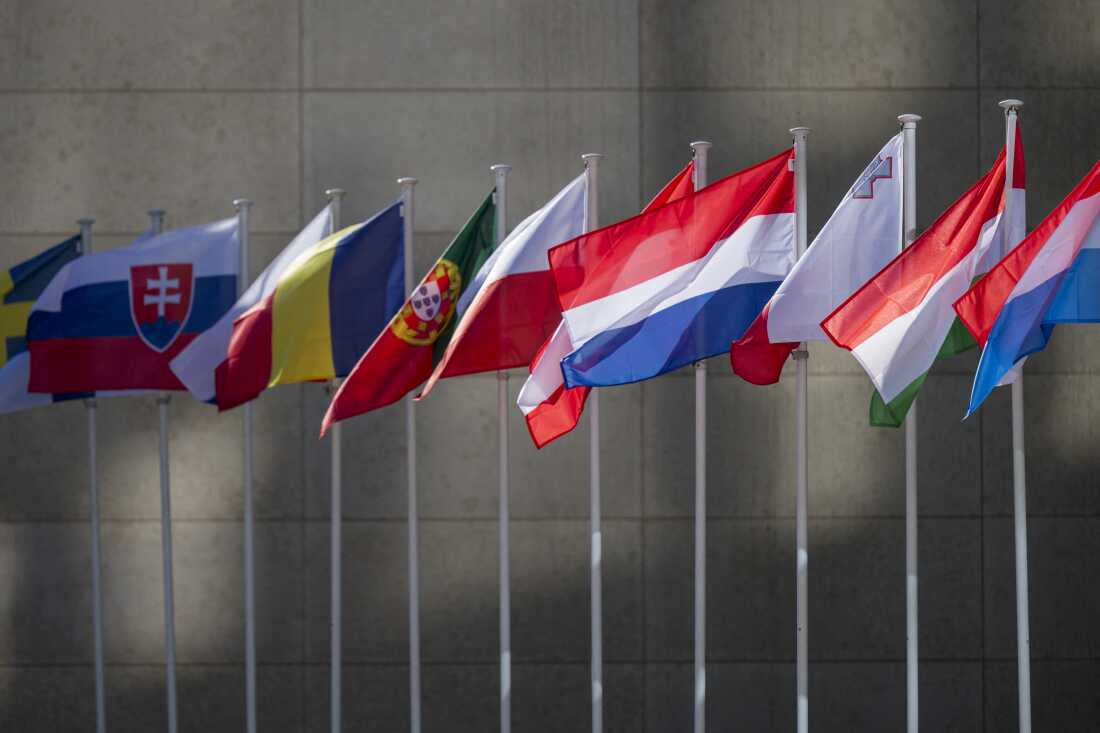
European flags fly at the EU Council building in Luxembourg on April 7.
JEAN-CHRISTOPHE VERHAEGEN/AFP via Getty Images
hide caption
toggle caption
JEAN-CHRISTOPHE VERHAEGEN/AFP via Getty Images
All member countries of the European Union except Hungary voted Wednesday in favor of proposals that would impose tariffs on specific U.S. products sold into Europe, starting next week.
The vote came just hours before President Trump said on social media that he would pause tariffs on most countries for 90 days but would immediately hike tariffs on China to 125%.

The proposals were first published on Monday by the European Commission, the EU’s executive branch that coordinates trading policy for the bloc. They were adopted at a meeting in Brussels on Wednesday, hours after drastic 20% tariffs on almost all European goods took effect.
Wednesday’s European vote came in response to an earlier set of U.S. measures announced by the Trump administration that slapped 25% tariffs on European steel and aluminum. The bloc said it was still working on its response to separate U.S. tariffs of 20% on European car imports.
It remains unclear whether European Union countries are among those affected by the president’s 90-day tariff suspension announcement — and whether the EU member countries might lift their own set of sanctions following the announcement.
EU retaliation measures
In its statement published after the vote to approve new measures, the European Commission called the initial round of U.S. tariffs “unjustified and damaging, causing economic harm to both sides, as well as the global economy.”
European officials said these latest “countermeasures,” as they called them, could be suspended at any time, but only once the United States agrees to what they termed a “fair and balanced negotiated outcome.”
The precise details of the new European tariffs will be likely published at the start of next week, a Commission spokesperson said, and are expected to target American motorcycles, poultry, fruit and wood, according to a draft copy of the list seen by Reuters.
If not canceled, they would take effect gradually, starting next Tuesday, with further rounds implemented in May and then the rest taking effect in December.
Europe escalates to negotiate
The European Union has shown it will retain some flexibility for its next moves, with the Commission saying in its statement after the vote on Wednesday that the EU’s “clear preference” would be to engage in negotiations with the Trump administration, in order to cement a trading agreement that is “balanced and mutually beneficial.”
French Trade Minister Laurent Saint-Martin reiterated this stance during a visit to Indonesia on Wednesday.
“We believe that a tariff war is harmful for everyone,” Saint-Martin said. “We must continue the work of dialogue and negotiation with the U.S. administration in order to achieve the most positive agenda possible.”
European stock markets closed lower on Wednesday, with indices in London, Frankfurt and Paris all having fallen around 3% on the day, capping falls of more than 10% over the past week since the latest round of global tariffs was first announced by President Trump.







